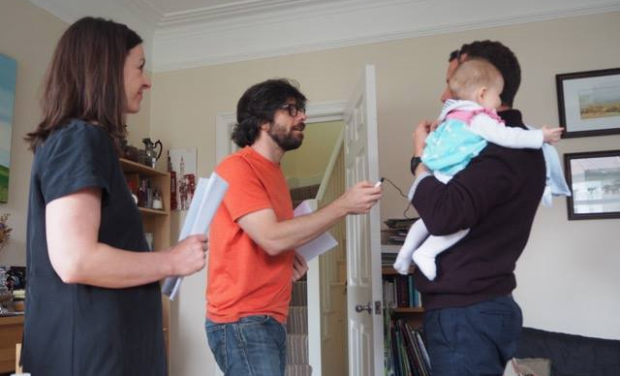Review: A Doll’s House (Various locations)
Theatre of Europe take Ibsen’s play into an actual family home and cast the hosts as their protagonists

© Theatre of Europe
Forget Hiddleswift. Nobody splits like the Helmers. When Nora leaves her husband Torvald at the end of A Doll’s House, the reverberations run through every marriage ever made – "the door slam heard around the world," so they say. Theirs is no conscious uncoupling. It is a sudden shock of a separation.
So it is no small thing to cast a real couple as the Helmers – and not just onstage, after weeks of rehearsal, but in their own home, completely impromptu. Danish company Fix and Foxy do exactly that.
Brought to Britain for the first time by Theatre of Europe, the company toys with reality. It’s staged Pretty Woman with sex workers, and cast asylum seekers as the six sitcom Friends. An hour after receiving the address, three actors turn up at a family home, and cast their hosts as the Helmers. Today, it’s Gemma and Will – mid-to-late thirties, a couple of years married, not their real names. An audience of ten crowds into their sitting room.
Today’s Helmers would probably live in a house like this: a two-up, two-down in Wimbledon. Their wedding photos are on the mantelpiece. Their small baby greets us with gurgles. They’ve only recently moved in, seeking space for a family, and their furniture’s nice; not lavish, but comfortable and considered. Sat on their sofa, they’re quizzed about their relationship: how long they’ve known each other, how long they’ve lived together. He’s a management consultant. She’s on maternity leave. Does he have a private space? Does she have a secret stash of chocolates?
The cast coach them through their roles, feeding instructions and lines, and, as they do, the two relationships blur: Gemma and Will’s with Nora and Torvald’s. Real routines slot into a fictional relationship – certain spots on the sofa, ways of holding hands or hugging; real memories and feelings become its foundations. Sometimes, the couple answer as themselves – what makes their relationship, what might break it; sometimes they’re definitely acting. Yet in the process, enactment triggers emotions; an imaginative exercise grows out of and impacts on reality. It’s a powerful, powerful thing: tender, tentative and charged.
There are ethical concerns, though, big ones – questions of consent and exposure. This is a real intrusion into a real marriage: an uninvited intervention that will likely leave some stain or other – perhaps positive, perhaps not. The piece coaxes, arguably coerces, private intimacies out in public and, while participants needn’t be truthful, there’s pressure not to derail proceedings. Our voyeurism as an audience – and a lot of the fascination comes from prying into private lives – is never remotely critiqued.
Nonetheless, it reveals Ibsen’s play anew – not least its ongoing relevance. Onstage, the patriarchy can overshadow the people. Couched in particularities, woven into an actual marriage, that dissolves. Psychology comes before social structures and, rather than the usual belittling imbalance, it restores real love to the relationship. Nora’s desperate tarantella becomes a soft slow dance, and her actions become all too reasonable – not least as Gemma essentially improves them, her responses the exact same as Nora’s. Her bind is horribly clear, as are the bonds between husband and wife. Shut away upstairs, you realise how oblivious Torvald/Will is to it all; how little control he has over his actions, and yet how inexcusable his final rejection is nonetheless. "Does it end there?" Gemma’s asked. "Probably not." Coat. Shoes. Slam.
A Doll’s House runs until 10 December at domestic addresses in London. The address is communicated via email 24 hours before each performance. Click here for more information.
Running time: 1 hour 15 minutes.












